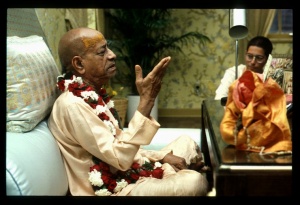SB 4.8.2

A.C. Bhaktivedanta Swami Prabhupada
TEXT 2
- mṛṣādharmasya bhāryāsīd
- dambhaṁ māyāṁ ca śatru-han
- asūta mithunaṁ tat tu
- nirṛtir jagṛhe 'prajaḥ
SYNONYMS
mṛṣā — Mṛṣā; adharmasya — of Irreligion; bhāryā — wife; āsīt — was; dambham — Bluffing; māyām — Cheating; ca — and; śatru-han — O slayer of enemies; asūta — produced; mithunam — combination; tat — that; tu — but; nirṛtiḥ — Nirṛti; jagṛhe — took; aprajaḥ — being childless.
TRANSLATION
Another son of Lord Brahmā was Irreligion, whose wife's name was Falsity. From their combination were born two demons named Dambha, or Bluffing, and Māyā, or Cheating. These two demons were taken by a demon named Nirṛti, who had no children.
PURPORT
It is understood herein that Adharma, Irreligion, was also a son of Brahmā, and he married his sister Mṛṣā. This is the beginning of sex life between brother and sister. This unnatural combination of sex life can be possible in human society only where there is Adharma, or Irreligion. It is understood that in the beginning of creation Brahmā created not only saintly sons like Sanaka, Sanātana and Nārada but also demonic offspring like Nirṛti, Adharma, Dambha and Falsity. Everything was created by Brahmā in the beginning. Regarding Nārada, it is understood that because his previous life was very pious and his association very good, he was born as Nārada. Others were also born in their own capacities, according to their backgrounds. The law of karma continues birth after birth, and when there is a new creation, the same karma comes back with the living entities. They are born in different capacities according to karma even though their father is originally Brahmā, who is the exalted qualitative incarnation of the Supreme Personality of Godhead.